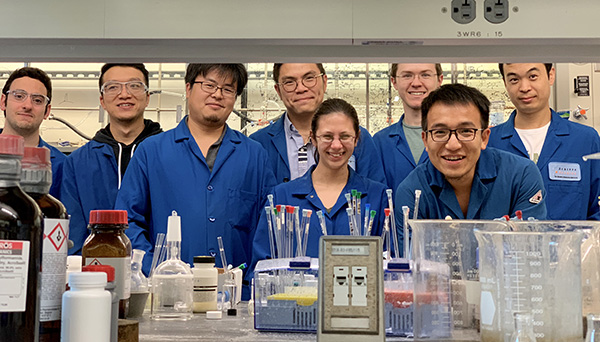Florida Outstanding Mentor blends stoicism and intensity to advance his field
One mentor taught him by example; one through encouragement and one through critical inquiry.
November 20, 2018
 The Society of Research Fellows at Scripps Research in Florida named chemist Hans Renata, PhD, the Outstanding Mentor for 2018 in recognition of his dedication to his students and postdoctoral fellows. Renata’s lab members say he embodies both patience and high expectations.
The Society of Research Fellows at Scripps Research in Florida named chemist Hans Renata, PhD, the Outstanding Mentor for 2018 in recognition of his dedication to his students and postdoctoral fellows. Renata’s lab members say he embodies both patience and high expectations.
“He is in the lab before most of us arrive and stays after most of us have left,” says graduate student Emma King-Smith. “Seeing your mentor so dedicated in his research inspires all of us to push ourselves.”
Renata recalls three important mentors during his studies and preparation to become a chemistry faculty member. His most recent mentor, Frances Arnold, PhD, of Cal-Tech, recently won the 2018 Nobel Prize in Chemistry. He worked as a post-doctoral fellow in her lab. It was a place of intense, tough questioning, he recalls.
“She always asked, ‘What’s interesting about the solution that you’ve worked out, and if it is successful, how will it change the field you are working in?’” Renata recalls. “I guess that caused me to be more critical in examining my own work.”
Renata’s lab develops tools to functionalize carbon-hydrogen bonds with enzymes. As he describes his work, an uncommon mixture of both stoicism and passion emerge – qualities that his lab members prize.
“If you can functionalize one of these carbon-hydrogen bonds in a selective manner you can begin to create something that will be more useful for people,” he explains.
Their work is producing interesting new techniques.
“I think we have developed a pretty nice set of tools to functionalize carbon-hydrogen bonds with enzymes, and we’re really excited about the applications of this process,” Renata says. “We have things in the pipeline that hopefully can become novel antibiotics and also, hopefully, anti-cancer agents.”
That cool intensity makes Renata both an exciting and supportive mentor, says Christian Zwick, III, a graduate student.
“I think his strongest quality is his patience. He’s stoic, meaning he’s never discouraged,” Zwick says. Yet, “Hans is very passionate about his work. We’ll often text late into the night discussing ideas or results.”
Good mentors frequently lead by example, Renata notes. During Renata’s undergraduate years at Columbia University, chemist and newly minted professor Tristan Lambert, PhD, gave Renata his first lab position. Amid all of those firsts, Renata absorbed many lessons about outfitting a lab and launching new research projects.
As a graduate student at Scripps Research in La Jolla, California, he worked alongside chemist Phil Baran. Renata calls Baran, “one of the leading figures in the world of organic synthesis.” It was an incredible place to learn, he says.
“Every time you’d talk to him about your ideas, as long as they seemed to be grounded in some sound fundamental concepts he would always encourage you to try them,” Renata says. “He would allow you to think through your idea and your process.”
As his own students go off into the world and take positions in industry and academia, he hopes they will take away that lesson of independent inquiry, as well as the drive to change their field.
“For the field to keep going, you want to make sure that the next generation of scientists will be better than you,” he says.
For more information, contact press@scripps.edu

